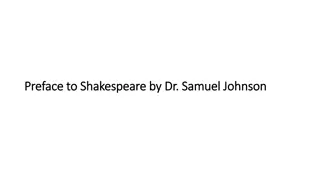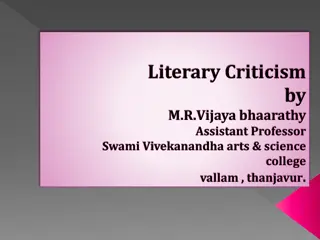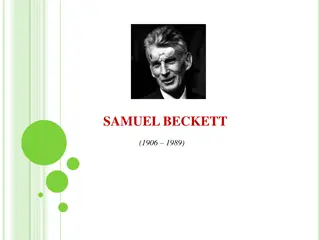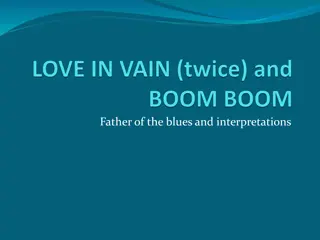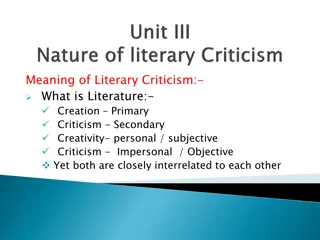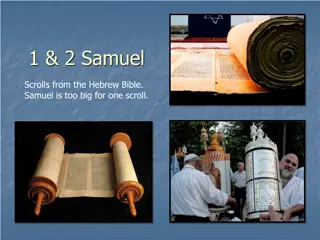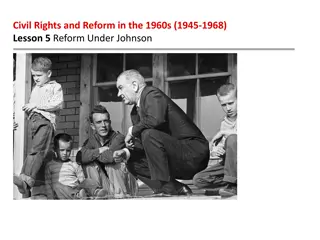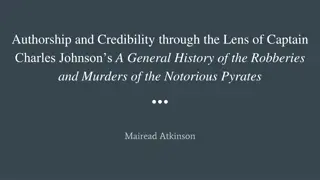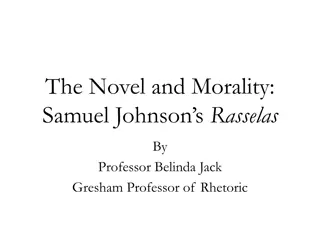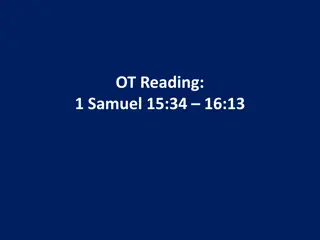The Life and Literary Contributions of Samuel Johnson
Born in 1709 in Lichfield, England, Samuel Johnson overcame early health challenges to become a renowned English writer. He wrote various literary works, including the influential "A Dictionary of the English Language." Despite facing personal struggles, his contributions to English literature remain significant, shaping the language's development. Johnson's life is a testament to perseverance and literary excellence.
Download Presentation

Please find below an Image/Link to download the presentation.
The content on the website is provided AS IS for your information and personal use only. It may not be sold, licensed, or shared on other websites without obtaining consent from the author.If you encounter any issues during the download, it is possible that the publisher has removed the file from their server.
You are allowed to download the files provided on this website for personal or commercial use, subject to the condition that they are used lawfully. All files are the property of their respective owners.
The content on the website is provided AS IS for your information and personal use only. It may not be sold, licensed, or shared on other websites without obtaining consent from the author.
E N D
Presentation Transcript
Samuel Johnson Ian Lawson Anton Nelson Hima Tammineedi David Melvin
The Life Born 1709 Lichfield, England Unhealthy child Scrofula Loss of hearing, blind in one eye Father was a bookseller Spent time in the shop reading Started learning early on Went to Oxford Dropped out due to finances
The Life cont. Married Elizabeth Porter (21 years older than him) Moved to London Wrote book reviews, biographies, other periodicals Wrote a few poems in 1730s-40s Literary works became more popular in 1750s Dictionary Rambler essays Idler essays Received government pension in 1762 Fixed many financial problems
The Life cont. James Boswell wrote biography of Johnson The Life of Samuel Johnson Continued writing towards close to his final years Became depressed as many of his friends left him Stroke in 1783 Died 1784
Video https://www.youtube.com/watch?v=IpVP8ezoVlM&t=1066
Literary Terms Denotation and connotation Denotation: Basic meaning or reference of an expression, excluding its emotional associations Connotation: The emotional associations or implications of the word Thesis and argument Thesis: Main idea that is supported in a work of nonfiction prose Argument: Presents reasons for accepting or rejecting a thesis
Literary Works A Dictionary of the English Language A Brief to Free a Slave An Account of the Life of Mr Richard Savage The Rambler
A Dictionary of the English Language Used examples (aka illustrations ) to highlight English language in use Used connotative and denotative definitions Used witty humor to define words Made English language copious with order Each definition serves as a short narrative of a slice of the language
Some Entries of the Dictionary... Lexicographer: A writer of dictionaries; a harmless drudge that busies himself in tracing the original, and detailing the signification of words. Dull: Not exhilaterating (sic); not delightful; as, to make dictionaries is dull work. Oats: A grain which in England is generally given to horses, but in Scotland supports the people
Purpose of A Dictionary Printing press caused an explosion of literacy Printing consortium wished to establish a dictionary, but could not afford to Dictionaries printed before Johnson s were of poor quality, gave no examples Johnson created his dictionary with six assistants from the consortium First dictionary to give sense of English language as it is used
Critical Response Most feedback of the time was positive, applauding the scope of the work Adam Smith applauded work in a 30 page anonymous review Did request foreign words be expunged from future editions Humor and use of examples were criticized Gentleman s Magazine: Any schoolmaster might have done what Johnson did Modern lexicographer s call use of examples it s strongest point
Fun Facts about A Dictionary Four volumes (21 lbs of book) Definition of take covered five pages Illustrated and comprehensive First modern dictionary
Activity Time Define these words using Johnson s style: Student Teacher Physics Failure College Sleep
A Brief to Free a Slave Joseph Knight was a slave who wanted freedom from his Scottish master Johnson wrote the brief in order to advocate for Knight s release because he detested slavery Boswell actually countered Johnson s arguments by saying that abolishing slavery would ruin the order of everything and would cause chaos
Excerpt from book Pg. 623
Analysis of A Brief to Free A Slave Thesis: No man is by nature the property of another Arguments: If someone were to be jailed, that does not mean that his descendants should be jailed; the same can be applied to slavery An individual may, indeed, forgeit his liberty by a crime; but he cannot by that crime forfeit the liberty of his children. There are no natural laws that dictate that Knight should be enslaved He is certainly subject by no law, but that of violence, to his present master, who pretends no claim to his obedience, but that he bought him from a merchant of slaves, who right to sell him never was examined. Knight has not given permission to forfeit his rights if no proof of such forfeiture can be given, we doubt not but the justice of the court will declare him free.
Activity Time Write a paragraph about something you feel strongly about Then give it to a partner who must then write the thesis for your paragraph


